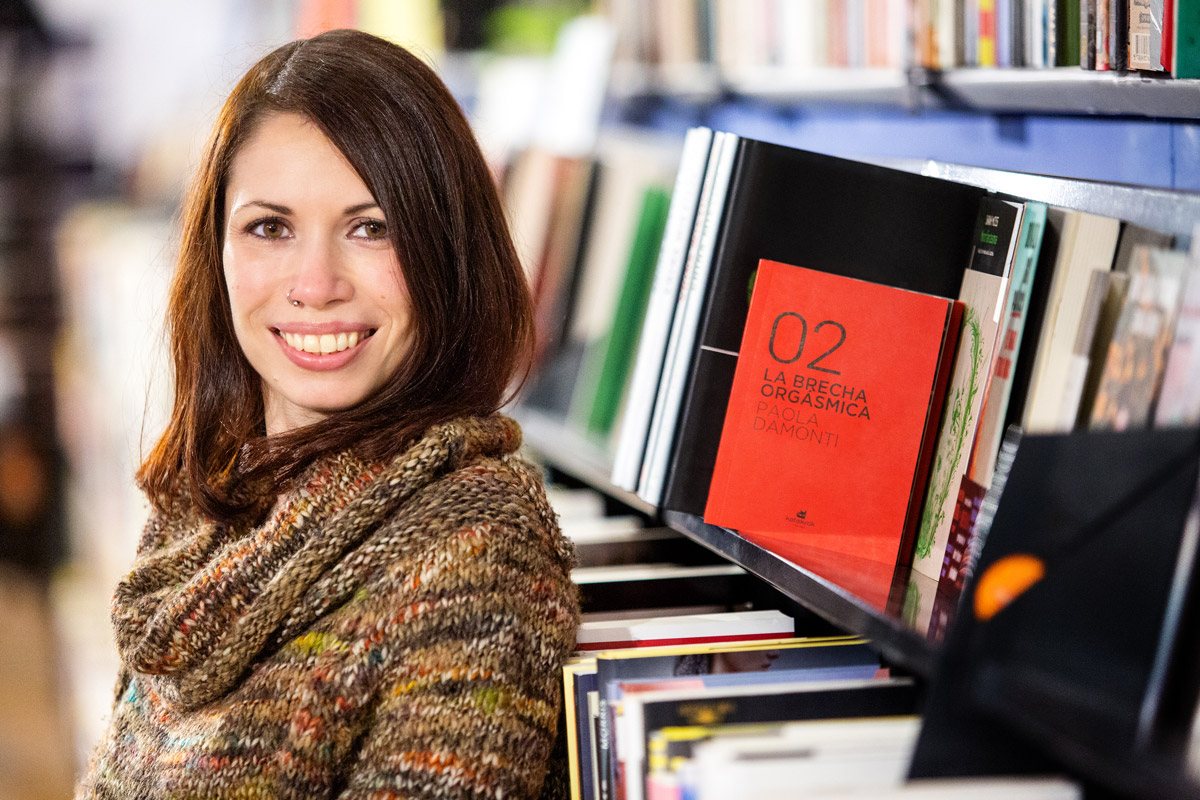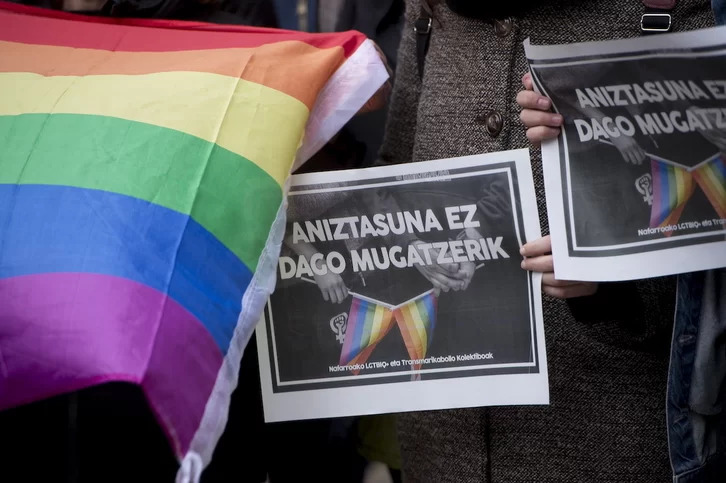"80% of women have no orgasm in intercourse"
- We've learned to identify the privileges men have thanks to feminist initiatives. We know what the wage gap is, the orgasm gap is still unknown to us and a little frivolous. Researcher and activist Paola Damonti has insisted on the need to broaden this reflection.

Zientzia Politikoetan eta Nazioarteko Harremanetan lizentziatua da Milango Unibertsitatean. Norbanako, Familia eta Taldeekin Esku Hartze Sozialeko Masterreko ikasketak egin ditu NUPen, eta Generoan Aditu titulua du unibertsitate berean. Gizarte Esku-hartzean eta Ongizate Estatuan doktoretza lortu zuen Genero-indarkeria bikotean eta gizarte-bazterkeria. Desberdintasun-egituren arteko elkargunearen ondorioak izeneko tesiarekin.
Ikerketa lanak egin ditu hainbat erakundetarako, besteak beste NUPerako, eta orain EHUn hasi berria da beste ikerketa proiektu batean lanean.
Argitara eman berri du bere lehen liburua, La brecha orgásmica (Orgasmo arrakala), Katakrak Liburuak argitaletxearekin, abenduaren 29an aurkeztutakoa. Euskaldunberria eta hiztun bikaina.
How a Milanese in Pamplona?In 2007
I came to the Basque Country with an Erasmus scholarship and stayed here. My intention was to go to Barcelona, but they did not catch me. Pamplona was my second chance. I only knew about this city that there were sanfermines and that it was a party linked to bulls, and I didn't have any illusions, but I met the people and I liked the atmosphere. I found it a small, nice, politicized city, and I really like that.
When I finished Erasmus, I finished distance learning at the University of Milan.
How did she get to gender studies?
When I was studying Euskera in an occupied town, in Zazpi, in a self-managed boarding school, a friend told me that there were possibilities to apply for scholarships for a doctoral thesis. After obtaining the scholarship, I studied male violence within the couple and social exclusion. Since then, I've been researching in different groups and projects and also on my own, as an autonomous researcher. From time to time I usually give lectures, because for me it's an opportunity to be with people and to spread my research.
One of them, about the orgasm gap, was censored by the City Council of Pamplona last January. Have you done any favor?
Yes. Just what the mayor, Enrique Maya, didn't want. I was asked to prepare something for the opening of the Women's House, but two days before the conference called me the technique of equality to tell me that it had to be suspended, because in the city hall they did not see it right. It seemed incredible to me. I know that some things are censored here, but normally those related to the Abertzale left. The subject opened up, and as a result, a lot of people approached the talk we did a few days later in Katakrak. The room was crowded with people who couldn't get in. So the idea of making a book also emerged. The reaction of the people was very positive and, in addition, recently, the Administrative Tribunal of Navarra (TSJN) has withdrawn Maya’s case. He tells Navarra Suma that the institutions are not theirs even if they are in power.
Orgasm Gap: How Patriarchy Attacks Us To Bed. What are you talking about at this conference?
The orgasm gap is a parallel to a much more well-known concept of the wage gap.
Women, systematically and for structural reasons, pay less in the labour market than men and, for the same structural reasons, in sexual relations we have less orgasms or less chance of having them than men.
The claim of Orgasm is not very
common… Yes, it is. There is a lot of talk about feminism, but most of the demands talk about material things: inequality in the labor market, the wage gap, the double day of women… but the sexual sphere is completely discarded. You only talk about sex when you talk about aggression. These are, without a doubt, the most violent expressions on issues of gender inequality, but not the only ones.
Patriarchy strongly influences sexual relations and systematically conditions women's access to pleasure. Millions of data show that there is an orgasm gap. According to the data, almost two out of ten women who have sex do not have orgasm. And another fact: three out of four women, 75 percent, don't always have orgasm in their sexual intercourse. For men, it stands at 28%, according to a study carried out in 2017 in Belgium and the Netherlands. We could say that today the odds that women have orgasms through intercourse and that Bildu is a voter in Pamplona are the same.

The idea that has prevailed so far over the data is that lack of orgasms is a problem for women, but my thesis is that reason has to do with the social and patriarchal structure in which we live and not with biological issues. We found evidence of this, for example, in an investigation carried out in the United States. There he wondered about orgasms and also about sexual orientation, where it was clear how the gap between heterosexuals is impressive, but it almost disappears especially among lesbians. There's something else. I think we have to look for the origin in the construction of the person. Women are built as beings for others and men as beings for themselves. This explains why women give more importance to the pleasure of others than to their own. This archetypal construction is fundamental to understand the gender system.
Another important element to understand this situation is coitocentrism. Many researches point the same way: most women, 80%, have no orgasm in intercourse and, on the other hand, if the image they sell us of sex is that of intercourse and in those cots all women have orgasms. The message we are selling is that the practice is the poor queen and all the other “antecedents”. Therefore, orgasms that most women have are peripheral practices.
We can only understand this from the androcentrism that we have here. That's putting men's eyes at the center, but the way men feel pleasure and orgasms doesn't apply to the whole society.
Is it alarming for some to talk about orgasms?
No doubt. Among those who have right-wing ideology and in progressive environments. In these progres environments it is often said that the goal is not to achieve intercourse, but the path, and that orgasms should not be given such importance. This discourse is not wrong in itself, but it forgets that the starting reality is not the same. We don't ask ourselves who orgasm is, and it's clear that on an equal footing everyone prefers orgasm. It's a plus. If we seem that equality is at the starting point, we avoid change. So, beware: let's not make an argumentative progre to enjoy without orgasms.
Is it not true that we are not making much progress in terms of pleasure?
Not too much. Although we probably have more pleasure than our grandmothers and viruelas, this situation generates more suffering today than 80 or 100 years ago, because then, quite simply, the pleasure of women was not foreseen. Today we live in a more complex society and there are still stigmas to be too puterous and, at the same time, the pressure of not being “frightened” and having a sex bomb in bed. We live in a successful society, and when you don't have orgasm, you somehow feel like you've failed. Emotional suffering is much greater today than it was before.
Girls under 25 have sex twice a week, but only 33% have orgasms at home. What's behind this is patriarchy.
That is why, and for justice, we must attach importance to this issue. We've got it internalized, I too have it that talking about this is a little frivolous. We're talking about gender-based violence, pay gap -- but who claims orgasms? Behind this idea is a small patriarchal being that lives inside everyone and tells us that, in the end, sex is not as important for women as it is for men.

What is the influence of pornography?
I'm not anti-porn by definition, but the porn that's out there today is a puppy. It's violent and savage and it sells a coding message. In addition, it is becoming more and more available. The problem isn't that the sex they sell isn't real or that beauty canons aren't real, because they're the same everywhere. The problem is that it's strong and it's mimicked. When you see that over time that model doesn't match reality, you change your attitude, but the effect of wild porn seen from the age of 10 is devastating. Porn doesn't help close the orgasm gap, but you don't just have to focus there, because porn doesn't help, but Sunday movies don't help either.
I devour all the series out there and they're all koitocentric. We're not talking about lack of orgasm. We only refer to our experiences in positive terms. We say how well we fought yesterday, but we didn't have orgasms. If we all share good things, it has the same effect as on social media. They're just showing pretty windows. People are becoming more and more lonely and it is therefore essential that there be a public discourse. It is great that the censorship of Maya leads to conferences, to publish a book, to make interviews… From that you can talk without necessarily having to talk about your personal experiences. That's very important to demystify all of this, and that's why I'm happy.
They have recently presented a study on gender-based violence suffered by older women. What was your intention? It is the work
we have done at the UPNA, promoted by the Navarro Institute for Equality. Very interesting and necessary. We did it because we saw that surveys say that older women suffer machista violence as much as younger women, but that's not seen in society. In Navarre, from January to June of this year, only 11.7% of the total complaints of gender violence filed by women over 50 years of age. Similarly, we observed that in the allocation of resources there are very few elderly women. Young women and those with young children are generally the focus of research and services on male violence. We wanted to know what's going on with those women who don't show up anywhere.
What characteristics does violence have in the elderly?
We analyzed two types of violence: on the one hand, the symbolic and structural violence, that occurs in society and that suffered by all women, and on the other hand, the direct violence that occurs in the couple. Both are very important. The sexist violence suffered by all women increases in older women, as in general there is contempt and invisibility. In series, novels, television… older women are not usually protagonists. Women began to disappear from the age of 30. Most of life is spent in invisibility, and that's tremendous violence with emotional and psychological effects. In this sense, we women suffer tremendous aesthetic violence. In youth we suffer the pressure of an unattainable model of beauty and from a certain age the structure tells us that we can no longer be attractive. Youth is the greatest value of women. In the case of men, this does not happen. In the fight for the U.S. presidency, we've seen two old men, but that wasn't in the speech, and there shouldn't be, but surely if they were women, it would have. Sean Connery died recently. How long was it a sex-symbol? Society faces symbolic violence.
And what is intra-family violence like?
Psychological violence is the most widespread. There are also physical aggressions, but in lower percentages. As physical and sexual violence decreases over the years, the other increases, the same that exists throughout society.
How do older women experience violence?
There are great inequalities in terms of age and the cultural and social situation. In general, it can be said that they learned traditional gender roles. In his youth, it was not about sexist violence, but about domestic violence. He had to be content with the man who touched him. They also have very internalized the Christian concept of acceptance, because that is the way to be a woman. In such circumstances it is very difficult to conceive that you have the right to send that man for a walk. In most cases, they think it's too late to get out of that relationship. By the age of 60, they already think this way and not so much for biological reasons, but because society thinks that a woman of that age can no longer expect anything from this life. Sometimes children do not want mothers to leave this situation, in many cases because of selfishness. The children know that if the mother leaves, the custody of the father will be of them. These women feel a lot of loneliness and helplessness. The feeling of having lost your life.
Young people start consuming pornography before, as porn is their only sex education. How on earth have we come here?
Today, it has to be acknowledged that thanks to the Internet it is much easier to see pornography. Unfortunately, through a click, the 7-9 year-old boy comes to... [+]
Zamora, late 10th century. On the banks of the Douro River and outside the city walls the church of Santiago de los Caballeros was built. The inside capitals of the church depict varied scenes with sexual content: an orgy, a naked woman holding the penis of a man… in the... [+]
























